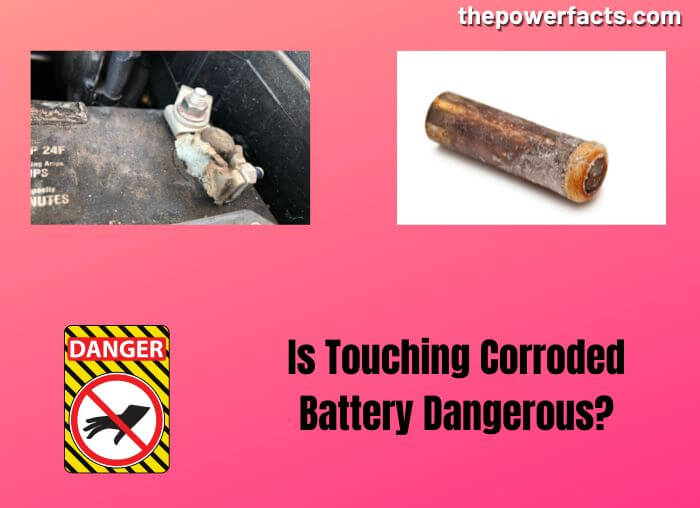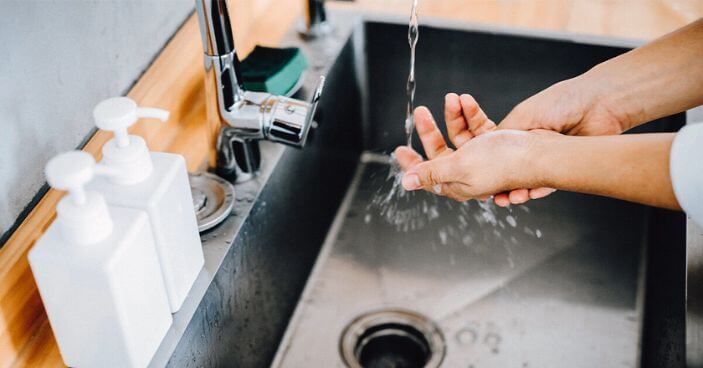Touching a corroded battery is dangerous. The chemicals inside the battery can cause burns. If the battery is punctured, the chemicals can leak out and cause further damage.
It is important to be careful when handling any type of battery, especially when they are corroded.

Most people know that batteries can be dangerous if they’re not handled properly. However, many people don’t realize that touching a corroded battery can also be dangerous. The acid in the battery can cause burns, and it can also be harmful if it comes into contact with your eyes or mouth. You can add battery acid to a battery but it’s not recommended.
If you have a corroded battery, it’s important to handle it carefully and dispose of it properly.
Touched a Corroded Battery
Corroded batteries can be extremely dangerous. If you come into contact with one, it’s important to take immediate action to ensure your safety.
- First and foremost: If you have any open cuts or wounds on your hands or body, wash them thoroughly with soap and water. This will help to prevent any further corrosion from taking place.
- Next: Remove any clothing or jewelry that may be in contact with the battery acid. It’s important to clean it up immediately to prevent damage to clothing and other surfaces. This includes watches, rings, bracelets, etc.
Once these items are removed, flush the affected area with cold water for at least 15 minutes. If you have access to a first aid kit, apply a generous amount of antibiotic ointment to the area and cover it with a sterile bandage. If you don’t have a first aid kit handy, simply wrap the area in a clean cloth until you can get medical attention.
It’s also important to seek medical attention as soon as possible if you suspect that battery acid has been ingested or inhaled. In these cases, call 911 immediately and follow their instructions.
Are Corroded Batteries Dangerous?
Corroded batteries are dangerous because they can release harmful chemicals into the environment. When batteries corrode, they release lead, mercury, and other toxins into the air and soil. These toxins can contaminate water supplies and cause health problems in people and animals.
Can Battery Corrosion Kill You?
Most people know that battery corrosion can be dangerous. After all, it’s the acidic residue left behind by batteries that can eat through metal and cause serious damage. But did you know that battery corrosion can actually kill you?
It’s true! In rare cases, battery acid can seep through the skin and into the bloodstream, causing serious health complications or even death. This is most likely to occur if the battery is leaking or if it comes into contact with an open wound.
If you think you or someone else may have been exposed to battery acid, it’s important to seek medical attention immediately. Battery acid poisoning can be treated if caught early, but it can quickly become life-threatening if not treated promptly.
So remember: always handle batteries with care, and be sure to dispose of them properly when they’re no longer in use.
And if you think you may have come into contact with battery acid, don’t hesitate to seek medical help right away.
What Happens If You Touch Dry Battery Acid?
If you come into contact with dry battery acid, it’s important to act quickly. The acid can cause serious damage to your skin and eyes, so it’s important to flush the area with water for at least 15 minutes. If you have any open cuts or wounds, the acid can also cause pain and irritation.
In some cases, it may even lead to burns. If you have a severe reaction, or if the acid gets in your eyes, be sure to seek medical attention immediately.
Why Do Alkaline Batteries Corrode?
As we all know, alkaline batteries are made with a variety of metals including zinc and manganese. Over time, these metals can corrode and break down, causing the battery to no longer work effectively. While it’s not clear exactly why this happens, it is thought that the breakdown is caused by a chemical reaction between the metals and the electrolyte inside the battery.
This reaction produces hydrogen gas, which can eventually lead to corrosion and breakage.
While most alkaline batteries will last for several years before showing any signs of corrosion, it is still important to be aware of this potential issue. If you notice your batteries starting to corrode, it’s best to replace them as soon as possible to avoid any damage to your devices.
Are Corroded Alkaline Batteries Dangerous?
Alkaline batteries are some of the most popular types of batteries on the market today. They are used in a wide variety of devices, from flashlights to smoke detectors. But what happens when these batteries start to corrode?
Are Corroded Alkaline Batteries Dangerous? Corroded alkaline batteries can release harmful chemicals into the air, which can be dangerous to breathe in. In some cases, the chemicals can also cause skin irritation.
If you come into contact with a corroded battery, it’s important to wash your hands thoroughly afterward. If you have any corroded alkaline batteries in your home, it’s best to dispose of them properly. You can either take them to a local recycling center or contact your local waste management company for instructions on how to safely dispose of them.
Is Battery Corrosion Flammable?
The short answer is no, battery corrosion is not flammable. However, the chemicals involved in battery corrosion can be dangerous if they come into contact with heat or an ignition source.
When a battery corrodes, it produces hydrogen gas and other chemicals.
These chemicals can be explosive if they are exposed to heat or an ignition source. That’s why it’s important to keep batteries away from fireplaces, stoves, and other sources of heat or flame.
Battery corrosion can also be damaging to your skin and eyes.
The chemicals involved in battery corrosion can cause burns, blindness, and even death if they come into contact with your skin or eyes. That’s why it’s important to wear gloves and safety glasses when handling batteries.
If you think your battery may be starting to corrode, it’s important to take action right away.
Remove the battery from whatever it is powering and clean the terminals with a solution of baking soda and water. Once the terminals are clean, apply a thin layer of Vaseline or another petroleum jelly to help prevent further corrosion.
How to Clean Battery Corrosion?
If your car battery has corrosion, it’s important to clean it as soon as possible. Corrosion can cause your battery to lose power and eventually die. If you have a battery corrosion problem, here’s how to clean it up:
| Remove the battery from your car | This is usually done by unscrewing the negative terminal first, then the positive terminal. |
| Inspect the terminals and cables for any damage. | If there is any damage, replace the parts before proceeding. |
| Use a wire brush to remove any corrosion | Use a wire brush to remove any corrosion from the terminals and cables. You can also use a solution of water and baking soda to help loosen and remove the corrosion. |
| Clean the inside of the battery | Clean the inside of the battery case with a cloth or brush. Be sure to remove any dirt or debris that could prevent proper electrical contact between the terminals and cables. |

Quick Facts
Is It Dangerous to Touch Battery Corrosion?
Yes, it is dangerous to touch battery corrosion. The main reason why is that the corrosive material that is present in battery acid can cause skin burns. In addition, if the corrosion comes into contact with your eyes, it can permanently damage your vision.
Finally, if you inhale the fumes from the battery acid, it can cause respiratory problems.
What Happens If You Get Battery Corrosion on Your Skin?
If you get battery corrosion on your skin, it can cause irritation, redness, and swelling. If the affected area is not treated, the corrosion can spread and cause more serious health problems.
What Should I Do If I Touched Battery Acid?
If you have come into contact with battery acid, the first thing you should do is flush the area with plenty of cool water for at least 15 minutes. If you have any open wounds, seek medical attention immediately. If you are wearing contact lenses, remove them and flush your eyes with water for at least 15 minutes.
Once you have flushed the affected area, gently pat it dry with a clean towel and apply a sterile bandage if necessary. You may also want to try applying a baking soda paste to neutralize the acidity and help soothe your skin. If you have ingested battery acid, call poison control or go to the nearest emergency room immediately.
Battery acid can be very dangerous if swallowed and can cause serious burns to your throat and esophagus.
Do You Have to Wash Your Hands After Touching Batteries?
There is no definitive answer to this question. Some people may choose to wash their hands after touching batteries, while others may not. It really depends on personal preference and/or the specific situation.
There are pros and cons to both washing and not washing your hands after touching batteries. Washing your hands after touching batteries can help remove any corrosive residue that may be on them. This is especially important if you are handling damaged or leaky batteries, as the chemicals can be harmful.
Washing your hands can also help prevent the spread of germs if you have touched a dirty battery. However, there are also some drawbacks to washing your hands after touching batteries.
First, it can be time-consuming, particularly if you are handling a large number of batteries.
Second, it is possible to damage delicate electronic components by getting water on them when you wash your hands; this is something to keep in mind if you are working with sensitive equipment.
Conclusion
There are many dangers of touching a corroded battery. The chemicals inside the battery can cause burns, and the acid can also be harmful. If you must touch a corroded battery, be sure to wear gloves and other protective clothing.
References: